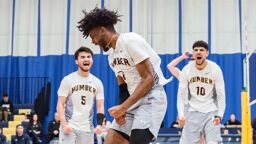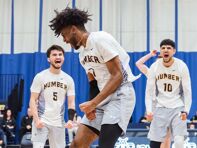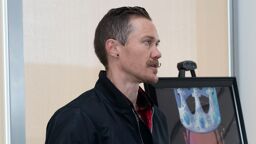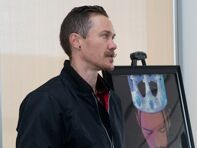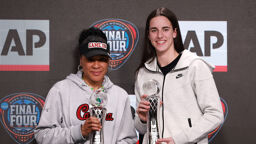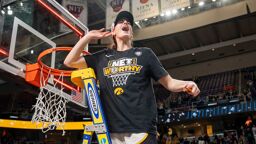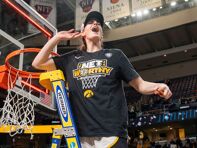It’s been a rough year for the transgender community in general and trans athletes in particular.
Even before states started banning trans student-athletes en masse, the backlash to President Joe Biden’s day one executive order signaling federal support for trans athletes seemed inevitable. Numerous prominent Republican figures from the former president to Sens. Rand Paul and Mitt Romney have utilized talking points that combined a lack of scientific understanding with transphobic language.
Within two weeks of that executive order, a new initiative called the Women’s Sports Policy Working Group was launched, promising a “science-based, ethical approach [that aims] to establish middle ground that both protects girls’ and women’s sport and accommodates transgender athletes.”
The prominent presence of Martina Navratilova as a co-founder of the Working Group didn’t help matters. Nor did the fact that at the time, there were only two trans people listed among its supporters — and one of them (Dr. Renee Richards) has been a longstanding critic of trans athlete inclusion.
Last month, however, provided a small measure of relief as trans athletes scored an important victory when the South Carolina state legislature voted to table its anti-trans HB 3477 (The “Save Women’s Sports Act”), suspending consideration of the bill going forward and making the act null and void for the remainder of 2021. The Working Group played a role in this turn of events by testifying against HB 3477, but it was not without controversy.
Working Group Stands Up For Trans Student-Athletes
On Feb. 23, Olympic gold medal swimmer and attorney Nancy Hogshead-Makar appeared virtually before the South Carolina legislature on behalf of the organization she co-founded. She asserted the Working Group’s belief that “wholesale exclusion [of trans athletes] is not necessary or fair or probably constitutional” and that bills like HB 3477 are “not based on science. They’re based on bigotry and they’re based on looking for ways to make [trans women’s] lives difficult. I have a trans person in my family who I love very much. I think we all should come together and figure out a way to protect the girls’ and women’s category and then find ways to include trans and girls athletes.”
Emphasizing the Working Group’s “middle ground” philosophy, Hogshead-Makar also shared with South Carolina representatives the group’s belief that “if [trans women] don’t want to go on hormones and they do want to participate as part of girls’ and women’s sports, surely there are accommodations that we can all agree on that would welcome them into the space but not take the opportunity away from [cisgender] girls and [women].”
Following her testimony, Hogshead-Makar received criticism from transgender rights activists, including the ACLU’s deputy director for transgender justice, attorney Chase Strangio:
Nancy Hogshead-Maker testifying in South Carolina and taking 10 extra minutes and claiming to be trans affirming is the ultimate gaslighting. It is monstrous.
— Chase Strangio (@chasestrangio) February 23, 2021
Transgender activist, Hall of Fame triathlete and All-American duathlete Chris Mosier also weighed-in on Twitter:
and another testifying on video to ban trans athletes in South Carolina.
— The Chris Mosier (@TheChrisMosier) February 23, 2021
Yet they want to "compromise."
In an interview with The19th in February, Team USA BMX athlete Chelsea Wolfe accused the Working Group of trying to fix sports so that cisgender athletes cannot lose: “What they’re asking for is a complete guarantee on winning,” the trans athlete told journalist Kate Sosin. “And winning is not a human right. Participation in sport is a human right.”
What’s Changed? What’s Not?
The last time we reported on the Working Group, in February following its launch, we noted its goal was the “protection of girls’ and women’s sport” and that, as previously mentioned, the group excluded trans people from its core membership.
In the interest of supporting all girls — transgender and cisgender — Outsports contacted the Working Group in an attempt to get a more concrete understanding of its goals, its membership and whether its leaders have been listening to the objections brought forth by trans community activists since its launch.
Among the first pieces of new information we’ve learned is that two more prominent trans athletes have signed on as supporters. Working Group spokesperson Dan Cruz revealed that “We have four trans-identified supporters… [who] provide us with their advice and counsel.”
In addition to Dr. Richards and runner/researcher Joanna Harper, the WSPWG has gained the support of transgender athletes Juniper Eastwood (cross country) and Kirsti Miller (rugby), although it should be noted Miller’s name and profile is inexplicably missing from the “supporters” page. Tennis icon Chris Evert is the newest cis athlete supporter.
When asked to clarify each supporter’s stance on the issue of trans athletes competing according to their gender identity, Cruz responded, “All are supporters of inclusion — i.e. of our policy proposals.”
It turns out Working Group supporter Dr. Richards has somewhat modified her views on trans inclusion in sports. In a January podcast interview with SI’s Jon Wertheim, the transgender trailblazer called Biden’s executive order “stupid,” in terms of allowing “a 16-year-old boy to play on a girl’s tennis team, that’s insane. Now if you tell me you have a 16-year-old boy who’s been on hormone blockers at the very beginning of puberty, and hasn’t developed muscle mass, and the size of an ordinary, normal, XY male, that’s another story. But you can’t just have someone announce, ‘I’m a girl and so I want to play on the girl’s team.’ Come on, you know better than that, and so does everybody who’s got a brain.”
Previously, Dr. Richards had stated that bottom surgery was a prerequisite for a trans female athlete to compete with other women.
More importantly, we noted the Working Group changed its slogan from “protecting” to “Affirming Girls’ and Women’s Sport While Including Transgender Athletes,” at the suggestion of our Cyd Zeigler.
Communications Breakdown
In all our emails and DMs with the WSPWG, one point was brought up repeatedly: the Working Group wanted to emphasize that as it was forming, organizers repeatedly reached out to trans athletes and advocacy groups in order to solicit input and that they were frequently rebuffed.
When asked if the WSPWG would be open to meeting with more trans athletes and allies who support an inclusionary perspective like Harper’s, Cruz responded:
“We have been engaged in an ongoing, two-year dialogue with trans advocates who support inclusion. Our work very much reflects their continued input.”
Cruz’s assertions were echoed by Hogshead-Makar in a subsequent exchange:
“We had three different in-person meetings scheduled with trans activists, civil rights folks, scientists, and our group. And each one was cancelled — without giving us a reason for cancelling.”
Elaborating on the subject, Hogshead-Makar further related, “Our experience was that when some [members] deviated from the party line of full inclusion — without regard for the science based justification for a separate category — they were cancelled. There was no room for thought or exploration.”
A source familiar with the Working Group provided Outsports with copies of numerous email exchanges between the WSPWG and leading transgender attorneys, trans athletes, as well as activists from GLBTQ Legal Advocates and Defenders, the ACLU, and other groups serving the community.
One of these email chains contained a confirmation for a March 12, 2020 conversation in New York City between representatives from the Working Group and advocates on the topic of “ensuring equal opportunities for trans girls and women in high school and college sports.” This email was dated Feb. 11, 2020.
Three days later, on Feb. 14, the same contact sent the Working Group a cancellation notice, stating it was “due to the lack of availability/representation at the meeting.”
The Other Side
Outsports then reached out to more than two dozen sports figures and LGBTQ advocates who had participated in conversations with the Working Group during its formation. One of these sources revealed that a larger conversation with the Working Group had been canceled with the idea that one-on-one interactions could be more productive.
This same source shared their knowledge of what took place in initial conversations with the Working Group. According to the source, their colleagues had engaged in discussions with Working Group representatives as to why their policy proposals were considered unworkable. They went on to assert that the Working Group was publicly advocating for exclusionary policies while simultaneously proclaiming them to be compromises.
Outsports has further heard from multiple sources that further discussions between advocates and the Working Group were tabled when it was decided that neither side would be able to find a workable compromise.
“Biological Sex”
One issue has been a major point of contention between the two sides. In a USA Today editorial last month, Outsports Managing Editor Dawn Ennis illuminated a case of problematic language found throughout the Working Group’s philosophy statements:
“…the biggest problem is the Working Group’s use of the phrase ‘biological sex,’ which is frequently mentioned throughout its documentation. Those two words feature prominently in the ongoing debate over gender identity and sports…
“‘Trans girls/women are biologically male,’ the group’s website says. No. That’s wrong: they’re transgender. They were presumed male at birth. Calling their bodies ‘biologically male’ is transphobic. Instead, just say, ‘a trans girl’s body.’”
When presented with this criticism of the Working Group’s word choices, Cruz declared, “We have carefully considered this critique and are committed to the language we now use. Competitive sport is about the physical body and the women’s sport category is based in biological sex. As we explain in our materials, it is thus necessary for us to use the relevant scientific terminology. We try to do this as carefully and as respectfully as we can without intending any disrespect.”
Outsports also reached out to women’s sports and inclusion advocates Pat Griffin and Helen Carroll, who had also been in conversation with the Working Group in 2019 and early 2020. In an email to Outsports, they shed some light on the nature of the current stalemate:
“We would be willing to have more conversation; however, the lesson we learned from our lengthy discussions with Nancy, Donna [De Varona], and Doriane [Coleman] is that the likelihood that we could find a compromise policy acceptable to all is slim.
“We truly believe that all of us (Helen, Pat, Doriane, Donna, and Nancy) tried very hard to find some ways to move forward over the course of our year-long conversations, but stopped when it became clear we were at an impasse.”
So What Happens Now?
Admittedly, Hogshead-Makar has a lot on her plate right now: celebrating a federal ruling that protects Olympic and Paralympic athletes from abuse, leading the charge in exposing inequities between how men and women’s college athletes are treated and last week accepting an appointment to the U.S. Olympic Commission. So the Working Group isn’t her only priority.
But other than the publicity surrounding its launch and Hogshead-Makar’s South Carolina testimony, there has been a noticeable silence from everyone involved with the Working Group. At press time, there’s no evidence their efforts have even been noticed by anyone other than the news media—and that link is to Fox News, so it barely qualifies. To the best of our knowledge, this story is the longest article devoted to their efforts in the past month.
While the Working Group has brought more trans voices into its organization and demonstrated it made an effort to reach out to the community, that’s only a start. As trans athlete advocates have repeatedly made clear, they believe the Working Group’s actual policy proposals continue to be non-starters masquerading as compromise. Until that is adequately addressed, there won’t be any movement going forward.
More problematically, following Hogshead-Makar’s South Carolina testimony, the Working Group has gone radio silent while state after state has passed trans student-athlete bans. At a time when trans advocates have put out repeated code-red calls for help from every possible ally, those appeals appear have fallen on deaf ears at the WSPWG. Even when Republican lawmakers in Arkansas sent the governor the first bill in the nation to ban affirming gender transition-related healthcare, they did not say a word.
What’s worse, at the same time that many of these bills were being considered, Hogshead-Makar retweeted anti-LGBTQ news site The Daily Signal’s promotion of transphobe and author Abigail Shrier’s testimony against the Equality Act. We already know the WSPWG opposes the Equality Act unless it is amended with a carve-out to protect cisgender girls and women and that they still willingly use disparaging terms like “biological sex.”
But this retweet raises the more troubling question: do Hogshead-Makar and the Working Group also endorse Shrier’s fear-mongering scare-tactics, including the tired and disproven trope of rape and danger posed by “male-bodied” athletes in bathrooms? And the equally moth-eaten and false “threat” of male athletes transitioning just to dominate women’s sports? If you can’t bear to watch, read the transcript.
How would the so-called #EqualityAct impact women and girls?@AbigailShrier gave sobering insight in her testimony before the Senate Judiciary committee today.
— The Daily Signal (@DailySignal) March 18, 2021
More: https://t.co/Cg2ESCiFZu pic.twitter.com/USVvesbHTk
Outsports asked the Working Group if they planned to take any public stance in support of trans student-athletes, as Hogshead-Makar did in South Carolina. We also asked if they would agree to another meeting with transgender advocates at this crucial time.
So far, the only response to those questions has been more silence.
Hogshead-Makar did speak to our Cyd Zeigler in the latest episode of the Outsports podcast Five Rings To Rule Them All. She invited those with an idea for a science-based alternative to the term “biological sex” to contact them. We invite you to do so, and to listen to Cyd’s full interview, below.
EDITOR’S NOTE: Following the publishing of this story, Working Group co-founder Dr. Doriane Coleman wrote to Outsports to correct our reporting on the group’s response to anti-trans bills across the country. We asked the spokesperson for the Working Group to provide exactly this kind of information multiple times prior to going to press, but never received any, until today.
“Juniper Eastwood and I have written to the relevant legislators and governors in almost each instance,” she wrote, and she shared an article published today they co-wrote with tennis icon and WSPWG co-founder Martina Navratilova: N.C. bill goes too far in banning transgender girls from female sports. There are options.
She also noted that trans rights organizations have cited their work in their own press releases, and provided an example from Equality Florida.
Dr. Coleman went on to thank Outsports for what she called our “thoughtful reporting,” and added: “There is behind the scenes work going on. In addition to these communications, preparation for and following Nancy’s testimony in S.C. involved discussions with like-minded legislators who were looking to see the bill tabled. Not all good work is done in public, as I’m sure you know.”
Jennifer Levi, the recent co-winner of the Outsports Crusaders Triumph Award, also reached out to us to correct our reporting as it regards Dr. Coleman and Eastwood:
“Doriane Coleman and Juniper Eastwood have definitely not been ‘radio silent.’ I understand they have been writing to legislators and governors throughout the country opposing proposed bans, particularly where the legislatures have miscited their work. As you know, Doriane was instrumental in opposing bans in Idaho and Arizona in the last round. And I know she and Juniper have continued doing that this session.”
Speaking for Outsports, I appreciate these opportunities to provide more examples of how the Women’s Sports Policy Working Group is taking action on behalf of all girls and women and we promise to continue to report on those activities as we learn about them. — Dawn Ennis







